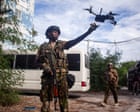
In recent days, significant events have unfolded across different regions, reflecting both the complexities and the resilience that often accompany global challenges. This news synthesis explores a mix of political, security, and humanitarian issues, shedding light on the intricate mosaic of contemporary world affairs.
In the Caribbean island nation of Haiti, recent developments suggest tentative progress in the ongoing struggle against gang violence that has plagued the capital, Port-au-Prince. Drone strikes have been employed to subdue criminal groups, providing a glimpse of hope for a populace weary of violence. For residents like Jimmy Antoine, the sound and feel of the ground shaking brought memories of past natural disasters. However, the use of drones is part of a broader strategy aimed at restoring safety and order, which has been met with cautious optimism by many Haitians. This approach reflects a nuanced attempt to reclaim parts of the city from gangs and restore a sense of normalcy.
Meanwhile, across the globe in Europe, former UK civil service head, Simon Case, has voiced concerns over China’s military exercises near Taiwan. In recent comments, he referred to Chinese President Xi Jinping as a “dictator,” highlighting the international unease over the increasing military presence and its potential impact on global stability. These remarks come amidst a UK defense review that casts light on the regional tensions that could reverberate far beyond the immediate vicinity of Taiwan. The strain in relations between China and the democratic island continue to be a focal point of attention, with nations around the world watching closely and preparing for the implications of escalated conflicts.
In a different region of the Middle East, the aftermath of a recent Israeli airstrike in Gaza is felt profoundly within the local community. A powerful 500lb bomb was used in an attack on a popular café, bringing distress and sparking debates about the nature of armed conflict in populated areas. Expert assessments suggest that the use of such heavy munitions in civilian zones could potentially qualify as a war crime, underlining the delicate balance between national security and humanitarian considerations.
This attack tragically claimed the life of Dr. Marwan al-Sultan, a highly regarded cardiologist and a key figure in Gaza’s healthcare system. Dr. Sultan, who also served as the director of the Indonesian hospital, was among several healthcare workers who have perished in similar incidents over recent weeks. His death presents a poignant reminder of the fragile state of healthcare in regions embroiled in conflict, compounded by the loss of essential medical personnel.
Turning to another significant event in the Middle East, the situation in Iran remains tense as a French couple, Céline Kohler and Jacques Paris, face allegations of espionage on behalf of Israel. This case has captured international attention, escalating diplomatic efforts to resolve it. The charges, which Tehran has maintained yet left unspecified regarding the country involved until now, contribute to a broader narrative of espionage and international intrigue in the region. As the couple continues to face legal proceedings, their plight underscores the complex diplomatic dimensions that come into play with such accusations.
Each of these events, while disparate, represents a thread in the complex tapestry of current global affairs. They remind us of the intricate interplay between peace and conflict, and the ongoing efforts by governments and societies alike to navigate these challenges with resilience and hope. As we reflect on these developments, the emphasis remains on fostering an understanding of the broader context and maintaining a mindful awareness of the interconnected nature of our world.
Source: {link}
